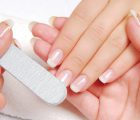
Glycolic acid is used not only in beauty salons, but also as a component of cosmetics available in drugstores. Many women decide to use glycolic acid at home. Before you know how it works for your skin and hair, find out what glycolic acid is.
What is glycolic acid?
Glycolic acid is one of the fruit acids, also called alpha-hydroxy acids, and in short AHA acids. Because glycolic acid has the smallest particles among all AHA acids, it is able to penetrate into the deepest layers of the epidermis.
Glycolic acid – action
The action of the glycolic acid depends primarily on:
- its concentration – the higher it is, the more effects will be noticeable,
- pH of the acid solution – low pH values make glycolic acid stimulate epidermal exfoliation and regulate its keratosis process. In turn, a higher pH makes the glycolic acid moisturizing.
Glycolic acid and its effects on the skin
Elastin and collagen fibres disappear with age, and their deficiency in the skin causes the loss of firmness and elasticity, unfortunately, wrinkles are its sad consequence. Glycolic acid stimulates the production of elastin and collagen, which is why it is a popular ingredient of various cosmetics and rejuvenating treatments.
In addition, glycolic acid supports regular exfoliation of the epidermis, accelerates skin regeneration and increases its hydration, as well as reduces skin pores and regulates the secretion of sebum. For these reasons, glycolic acid is used in treatments for oily and acne skin.
Regular use of glycolic acid can brighten post-sun discolourations, sunburns and scarring. What is more, it will moisturize the skin affected by ichthyosis (dry, thickened, scaly skin) and improve the condition of smokers’ skin. In addition, glycolic acid is an effective weapon in the fight against stretch marks and cellulite, and keratinized epidermis on elbows, knees and feet.
Glycolic acid and its effects on the hair
Glycolic acid is a component of shampoos for the care of dry and brittle hair and scalp with atopic changes, with keratosis disorders and seborrheic inflammation. This makes glycolic acid shampoos reduce and control excessive seborrhea, eliminate dandruff, prevent hair loss and support the fight against psoriasis and ichthyosis.





Leave a Reply